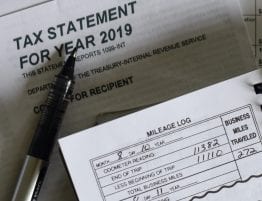Earning extra money from a side gig is rewarding, but it also comes with its own unique tax burden. If you work outside of your regular job as a freelancer, a waitress, a cab driver or a delivery driver; you need to think about your taxes.
If your net earnings are $400 or more from gig work even if the job is temporary or part-time, you need to file a tax return. If you do it as part of your regular job, then your employer needs to withhold tax for that work from your paycheck. On the other hand, if you work as an independent contractor, you may need to pay quarterly estimated taxes.
To help you avoid the tax traps of doing two jobs, Nerdwallet shares these guidelines of what not to do and why.
“Keeping lousy records
The self-employed can deduct business expenditures such as mileage, advertising, supplies, internet and other services they use to support their businesses. But those deductions need to be tracked and documented to survive an audit, McNeill says.
‘Keep records as you go along rather than try to figure it out after the fact,’ McNeill says.
Mileage tracking apps such as MileIQ and Hurdlr can help, as can expense management apps such as Expensify and Shoeboxed.
Ideally, side hustlers would open a separate checking account for their extracurricular income and expenses. Having a credit card just for the business can be a good idea as well. But a credit card statement isn’t enough to prove a legitimate business expense in an audit – the IRS wants to see the receipt as well, McNeill says. Tax pros recommend scanning or photographing paper receipts, since they can fade or be lost over time.
And speaking of tax pros, consider hiring one, especially if this is your first time working for yourself. A good CPA or enrolled agent can help you find deductions while keeping you out of trouble with the IRS.
Not paying taxes as you earn the money
Employees usually have income taxes withheld from their paychecks throughout the year. Typically, that’s not the case with side hustle income. Waiting until it’s time to file a tax return to pay the taxes can trigger not just a big tax bill, but penalties as well. The IRS wants people to pay taxes as they earn money, through withholding or estimated quarterly tax payments.
Most taxpayers can avoid penalties if, through withholding and estimated payments, they pay in at least 90% of the current year’s tax bill or 100% of the previous year’s tax amount.
Even those who dodge a penalty likely will still owe taxes on net self-employment income, however. (Net self-employment income is what’s earned from the side gig, minus deductible expenses and retirement plan contributions.)
McNeill suggests putting aside 25% to 30% of any side hustle income to cover the tax bill, since people who work for themselves usually have to pay a 15.3% self-employment tax to cover Social Security and Medicare contributions in addition to regular income taxes.
Ignoring retirement savings options
Tucking away some side gig income for retirement can help make your future more comfortable while reducing your tax bill today. Two good options for side hustlers are a SEP IRA and a solo 401(k). A simplified employee pension individual retirement account is easy to set up and allows people to contribute up to 25% of net self-employment income, to a maximum of $57,000 in 2020. A solo 401(k) has the same $57,000 cap, but it allows contributions up to 100% of net self-employment income. Solo 401(k)s involve a bit more paperwork, and the contribution limit is per person, so contributions to an employer’s 401(k) or other retirement plan count against the cap.
McNeill has one final caution: Make sure your side gig is actually worth your time. Some people discover they’re making less than minimum wage after paying taxes and other expenses, such as fees to an online freelancing platform. Review what you’ve cleared against the time involved to determine whether the extra hours are worthwhile.
‘If you’re going to do it, do it right,’ McNeill says. ‘Make sure you’re going to make money.’”
Fill out the form for a free and confidential consultation.








